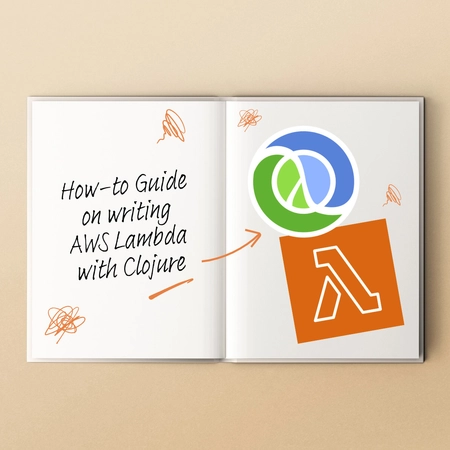AWS Lambda and Clojure frustrations
As part of our work with Clojure at Funding Circle I’ve been considering how best to approach creating AWS Lambdas. AWS Lambda has proven itself to be very useful for expediting small, discrete tasks. Lambdas can be used to process streaming events, to process storage events, to fulfill API responses, and a plethora of other use-cases, all without the need to manage any server or networking infrastructure. I don’t believe they’ll take over the backend world, but they’re here to stay, so we need a first class experience for creating Lambdas in Clojure!
Thus far, our collective ability to use Clojure to implement AWS Lambdas has been hampered, either by poor cold starts for Clojure or complex tool chains and deployment processes for ClojureScript. This is hindered further by the size of built artifacts. They are often larger than the Lambda console 3MB limit which prevents editing. This reduces our ability to try out small tweaks and experiments in the absence of our beloved REPL.
If only we had a way to implement Lamdas with Clojure that would combine
fast cold starts, with great runtime performance, easy editing in the
console, a simple packaging experience, and a large and accessible
library ecosystem. Enter nbb.
Serverless joy with nbb
nbb is a scripting tool that interprets ClojureScript using the nodejs
runtime. It was not made for AWS Lambda but is a great fit to the
constraints of a serverless environment. Specifically, nbb offers:
-
Blazingly fast starts: sub-millisecond. AWS provisioning latency is your only overhead, so no worse than any other language and better than many.
-
Simplicity: the code is interpreted directly rather than needing an intermediate build/compilation step.
-
Small and editable: nbb produces distributions with plain Clojure inside, and small enough to be edited in the console.
-
Performance: it has comparable performance to compiled ClojureScript programs (only modest overhead).
Hello World
The nbb docs give a simple hello world example that shows just how easy nbb makes writing lambdas in Clojure:
package.json: json {"dependencies": {"nbb": "^0.6.129"}}
index.mjs:
import { loadFile, addClassPath } from 'nbb'
addClassPath('.') // This is necessary when you require another .cljs file
const { handler } = await loadFile('./example.cljs')
export { handler }example.cljs:
(ns example)
(defn handler [event _ctx]
(js/console.log event)
(js/Promise.resolve #js{:hello "world"}))
#js {:handler handler}Just run np install, zip up the result, and you’re ready to deploy
using the Node.js Lambda runtime v14.x or later.
Local serverless
With nbb, local development is a breeze. No need for any emulators.
Just grab some sample JSON and start feeding it to your handlers that
you can run directly in the CLI or in a REPL.
API Gateway vs Lambda console testing
Often you want to put Lambdas behind the AWS API Gateway and be able to test them via the both the API Gateway console and the Lambda console.
The shape of the events is different depending on their source, so here’s an example of how to unify that approach. The same could be adapted for events from S3, DynamoDB, etc.
(defn parse-event
[event]
(let [clj-event (js->clj event :keywordize-keys true)]
(if (get clj-event :requestContext) ;; invoked via API Gateway.
(-> clj-event (get :body) (js/JSON.parse) (js->clj :keywordize-keys true))
clj-event)))Likewise, when responding, one needs to make the data specific for API Gateway. Here is one way:
(defn handler [event _ctx]
(p/let [response (-> event (parse-event) (->encrypted-response))]
(if response
(clj->js {:statusCode 200
:body (js/JSON.stringify (clj->js response))})
(clj->js {:statusCode 500}))))You can also specify a different Content-Type header to produce HTML,
CSVs etc.
Lambda URLS, ALB, etc
You can now access Lambdas via dedicated HTTP URLs - great for webhooks or such. Likewise, you can invoke Lambdas behind an Application Load Balancer with some further restrictions.
The model for producing valid responses is the same as that for API Gateway.
Performance tweaking
AWS Lambdas are capable of high performance, but we should be careful
about how we measure performance on nodejs - remember promises are
asynchronous. Fortunately nbb.core now has a time function that is
aware of this
(nbb.core/time (p/let [event' (-> event (parse-event))
response (some-async-call event')]
...)My Lambda has some crypto functions, but they should not be overly stressful for modern CPUs. Indeed, the Lambda runs with an acceptable latency of ~50ms on my local PC. However, even with a warm start, the same Lambda running in AWS would not complete in less than ~300ms. That’s not super slow, but it’s not great either.
Anything over 100ms for this kind of stuff makes me scratch my head. I reasoned that my local PC has a powerful 24-core AMD Ryzen9, 64GB RAM and a fast SSD. So was I cheating? Maybe the code or algorithms were not correct.
Before going there, and after some advice from @borkdude (of course) I tweaked the runtime of the Lambda, bit by bit:
-
CPU Architecture: from AMD → ARM.
- 10-20% better performance and, at very high scale, slightly lower cost.
-
RAM Provisioned: from 128Mb in doubling increments to 1Gb.
-
Big improvements on each increment up to 1Gb. Nothing meaningful in this case after that though YMMV.
-
$/ms prices go from $0.0000000017 to $0.0000000133. If you expect millions of calls this is worth caring about. For many cases, it won’t matter.
-
The resulting latency was ~30ms. Faster than my local PC! Maybe some Apple Silicon compares, but this was quite a pleasant surprise.
How? AWS allocates CPU linearly in proportion to the amount of RAM allocated, so by allocating more RAM we are allocated more CPU.
I didn’t do the maths to calculate the ROI of lower charging duration vs the increased cost per allocated MB but somebody at AWS did and here is the link.
So good news: with this level of performance, I’m not planning to make any code changes.
nbb and nodejs on Lambda - CPU bound?
The design of nodejs was meant specifically to enable evented IO. See this deep cut interview and transcript with Ryan Dahl from 2010.
One of the most important aspects of nodejs that developers need to be careful of is hogging the CPU: that prevents the event loop from making progress which can create huge problems on the server.
Lambdas are different: you can consume as much CPU as you wish because it’s not multi-user! This could result in new and simpler designs for Lambda functions.
nbb - managing promises
One might argue, given the above, that you are paying the cognitive price of the asynchronous model without any need.
With nbb - like any CLJS app - you can use
promesa, specifically p/let
which takes away 90% of that cost. All the promises inside the bindings
are resolved, in sequential order, before executing the body.
This is an example of the code to encrypt some data via nbb. It looks
like standard Clojure.
(defn- ->encrypted-response
[{:keys [signing-key encryption-key signature signed-property request-data]}]
(p/let [signing-key (import-signing-key signing-key)
encryption-key (import-crypto-key encryption-key)
signed-data (get request-data signed-property)
verified? (verify signing-key signature signed-data)
encrypted-data (when verified? (obtain-pin encryption-key))]
(when encrypted-data
{:pin encrypted-data})))Bonus: AWS Lambda expects to be returned a promise, and you get that
for free with promesa
Conclusion
Rounding things up:
-
Lambdas are here to stay and we need a first-class Clojure experience
-
nbbis the best candidate I have yet seen to claim this crown-
zero overhead start time
-
simple and small toolchain
-
Scripting with nbb is a great match for the design ethos of AWS
Lambdas: small, fast and direct. Check out the nbb docs
page for a bunch of
examples for all kinds of technology that nbb supports including AWS
Lambdas and GCP Functions.









